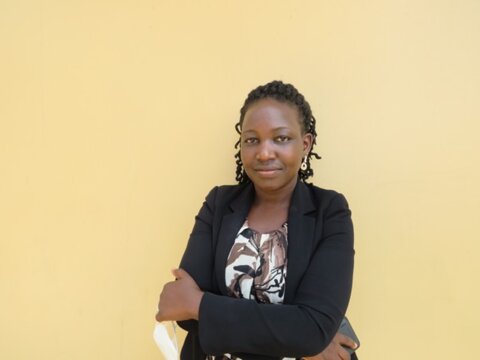
I am Stella Maleni, an ACACIA early career researcher from Uganda and will share the challenges I experienced doing research in the era of COVID-19 pandemic.
COVID-19 was first reported in December 2019 and has caused untold suffering globally ever since.
ACACIA research has been adversely affected by the pandemic. School-based data collection had just started when the pandemic hit. Lockdowns and restrictions have affected research activities since. Uganda had one of the longest school closures globally, resulting in notably tough research conditions.
Despite multiple challenges for the Ugandan team, they managed to collect 63.2 % of the quantitative data and 75% of the qualitative work, as well as conduct multiple stakeholder engagement activities.
I am Stella Maleni, an ACACIA early career researcher from Uganda and will share the challenges I experienced doing research in the era of COVID-19 pandemic.
Field work
The study’s full cycle includes designing and planning before the implementation of field work. The uncertainty surrounding reopening, caused by intermittent school closures, compelled most urban communities to resort to home learning. Besides the physical absence of children from schools, there were other challenges with materials and resources including printed data collection materials expiring.
Engagement with the schools
At the start of the pandemic, the team had invested in fieldwork preparations, having worked with a number of schools from which 316 children were recruited. The trust created during initial contacts between teachers, school children, local communities and researchers were heavily affected by the prolonged school closure. In particular, this led to a backlog of work, and so some schools that previously cooperated could no longer offer the same level of engagement.
We had to be flexible in conducting fieldwork as a consequence of COVID-19, for example by continuing research activities on weekends or within specific time limits such as 2:00-4:00.p.m, when students would be done with school activities. However, some schools could not accommodate any research. This was especially common in day schools that usually have limited school time compared to boarding schools.
Omission of some key tests of the study.
The study design initially included that children with asthma symptoms would undergo lung function tests (spirometry and exhaled nitric oxide) to evaluate the quantitative parameters that would depict the restriction/obstruction impact. The exercises and procedures of both the exhaled nitric oxide and spirometry are potential generators of aerosols during expiration. In both procedures, the researcher and students could be at exposure risk of COVID-19. In keeping with guidelines based on advice from the scientific community, the site could not perform these lung function tests for some children who were recruited into the study even when general restrictions eased, resulting in reduced participant numbers for this study component. We instead focused our efforts on study surveys and focus groups.
Project timelines: Different collaborating countries were disproportionately affected.
In Uganda the first lock down announced on 18th March 2020. Since then, most schools only operated for four months (March to June 2021) and currently remain closed until the new opening date slated for January 2022. This means the Ugandan team has not had the chance to do field based activities for most of the year and cannot keep pace with other collaborating countries. To utilise our time as effectively as possible we employed a number of strategies. For instance, we directly contacted parents/caregivers regarding participation in FGDs, helping us explain more about the studies. For some parents, we met at their workplaces to obtain consent for their children’s participation in the FGD. Some teachers also got increasingly involved in mobilising the students, which was very helpful. Adhering openly to a COVID Standard Operating Procedure built confidence and acceptance of our field activities. We also had to re-organize the research team to do screening and administration of the core questionnaire simultaneously on one day and within the allocated time.
Budget implications.
COVID-19 caused demand for certain supplies, not factored in the initial budgeting. For instance, PPEs such as masks and hand sanitisers have become mandatory for any field activity. There is also additional spending on training of research assistants. We have carried out two refresher trainings to prepare for field work, only for the schools to be closed before implementation. Air pollution monitors shipped into the country will now be returned for other research that needs them immediately since schools in Uganda will only reopen in January, effectively doubling the cost of shipping these devices.
Slow in regulatory review processes.
Some regulatory approval bodies moved to online submission and this was not without flaws in their systems. This shift has been associated with loss of time, before studies can be reviewed and approved.
Overcoming staff morale
The staff has invested time to prepare for ACACIA and CAPPA, and to face uncertainty on whether they will be able to implement the study has proved demoralising. Notwithstanding these challenges, it is important to mention that positives were realised, such as embracing online platforms to continue with project activities. The Ugandan team is leading the Early Career Researcher Group (ECRG) across the ACACIA network. Members of the ECRG benefited from a number of online training opportunities and international conferences, some of which would ordinarily not be possible. Notably, the massive online course on implementation research (MOOC) by The special Program for Research and training (TDR) hosted by the World Health Organization, the International Primary Care Respiratory Group (IPCRG) world conference of 2021 and the Global Health Research Network (GHRN) Early Career Researchers session.
We hope the team will have the chance to implement the theatre intervention in schools and CAPPA study when schools reopen in January 2022.
Author: Maleni Stella, ACACIA - Uganda
Date: 03/11/2021